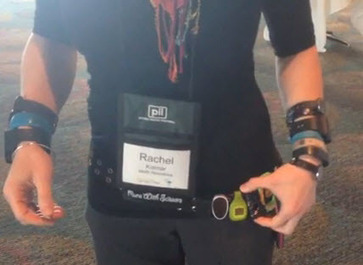
Rachel Kalmar is a data scientist and a one-person focus group for 21 personal trackers. The list included multiple Shines, a Fitbit Flex, Jawbone up, two Basis bands, a Lark Life, a Pebble, a Wii Fit Pulse, and a Body Media band and covered both wrists, a big chunk of her belt, her ankle and her upper arm.
At the Privacy Identity Innovation conference in Seattle last week, Liz Gannes of All Things D met up with her .
Kalmar said she sees these devices as early cell phone cameras: they were awful but they got better over time. Here are her three most surprising comments .
“Accuracy is the wrong question to ask.”
Gannes wanted Kalmar to name the most accurate tracker. Kalmar said a quantified selfer looking for accuracy should buy a triathalon GPS watch.
“The goal of all these is not accuracy but to get people to be more active,” she said. “The right question is: ‘What do you care about? Having the most sensors?’”
She recommended the Basis Band because it has 5 sensors including heartrate, galvanic skin response and a battery life of three days.
“We have a lot of barriers to an open data ecosystem.”
Kalmar said that she was hoping to learn about her behavior, but what she got instead was a lesson about the infrastructure of healthcare. She said she has gotten a better idea of the barriers to getting this data as well as the obstacles to interpreting it.
“I want my devices to interact with the rest of my world.”
Kalmar said that the Internet of things should provide motivation as well as data.
“I want my Internet router to get glacially slow if I haven’t moved enough, but if I can only get step counts at the end of each day by downloading a CSV file, it’s not going to help me very much,” she said.
by Shane Turner via NursingFacultyJobs.com
No comments:
Post a Comment